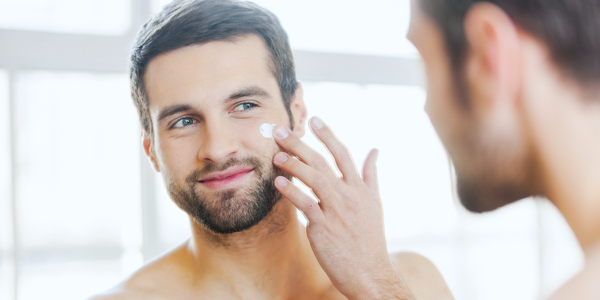
Why do body care and good skin routines have to be so complicated? Healthy skin dermatology may be scientific, but how to take care of your skin should be simple. No matter the skin type, everyone deserves to have their skin nourished
Read on for body and skin care basics, including 10 evidence-based tips for healthy skin.
Body & Skin Care Basics
Simply examining the skin is the first step to skin care. Skin self-exams are key to identifying one's basic skin type and possible skin issues. Dermatologists can also help advise against certain products and towards healthy skin habits.
Skin Care Essentials
Everyone's essentials will differ based on the needs of their unique skin. Some people have oily skin, others have dry skin, and some have a combination of both!
To find one's own skincare essentials, a skin type test or a trip to the dermatologist can help. Common essentials include a cleanser, moisturizer, toner, and sunscreen. Within those categories, identify the proper product for the skin's needs.
Another component of skincare essentials is caring for skin conditions. People with skin conditions may need to find products suited for sensitive skin. Ask a dermatologist about prescription options for skin disease treatment.
Skin Care Equipment
Self-tanner lotion, which is often used with a glove that looks like an oven mitt, can help produce that sun-kissed look without the risks. Be sure to glance at the back of the bottle before lathering up to identify ingredients.
Skin Care Factors
The skin is resilient, but it also can become vulnerable to exposure. Skin health is impacted by many factors, including:
• Ultraviolet radiation (i.e. tanning beds)
• Chemical toxins (i.e. tobacco)
• Unprotected sun exposure
• Nutrient deficiencies (i.e. not getting enough fluids, vitamins, or minerals)
• Lack of restful sleep
• The aging process
One could be doing everything "right" when it comes to skin care. However, neglecting these key elements can leave them without the results they desire.
Skin Care Routine
Having a daily skin care routine is necessary to maintain overall skin health. It can improve certain concerns such as acne, scarring, and dark spots.
Early investment in skin health can better protect the skin from common threats. Most routines (for normal skin types) have four basic steps:
1. Cleansers
Cleansing should happen once to twice a day, in which a good cleanser should not leave the skin feeling "tight". Those with dry skin or those who don't wear makeup can get away with washing their face once each day.
2. Serums & Toners
When formulated in the most stable and best absorbed form, vitamin C serum may be beneficial for the skin. Skin can use vitamin C, which is crucial to maintaining skin health, when it is in the form called ascorbic acid. Vitamin C helps perform the following functions to keep skin healthy:
• Antioxidant
• Collagen production
• Prevention of sun damage
• Replenishment of vitamin E after sun exposure
Toners can also help to soften and calm the skin. Like serums, they restore nutrients and can minimize irritation of the skin.
3. Moisturizers
All skin types (even oily skin) need moisturizer. A lightweight, gel-based, non-comedogenic moisturizer can help those with oily skin. A cream-based moisturizer may be better suited for those with dry skin.
4. Sunscreens
Many modern moisturizers come with sunscreen already in them. Make sure to apply sunscreen at least 30 SPF about 15 minutes before heading outside. This is due to the fact that sunscreen takes time to activate (and even more on sunscreens below).
An appropriate sunscreen can prevent or minimize the following:
• Wrinkles and other signs of aging
• Uneven skin tone
• Loss of skin firmness
Exfoliants can also be an essential part of skin care. However, they are intended to be used only weekly and not every day.
Skin Care at Home
Testing a new product at home can be a great way to find out if it is suited to sensitive skin. Apply a small amount of the product to a discreet patch of skin, and then wait at least 48 hours to watch for a reaction.
An allergic reaction may exhibit the following symptoms:
• Irritation
• Redness
• Small bumps
• itchiness
Check again at 96 hours for a delayed reaction before using the product again.
Skin Care Tips and Tricks
The skin is resilient on its own, but it can become radiant with the right treatment regimen. The first step is to learn what skin type exists. Then, a plan of action and a realistic routine should be put into practice.
The following 10 tips simplify the skin care process.
1. Consider Day vs Night Skin Care
When planning a skin care routine, focus on prevention and protection in the morning. This will enhance the skin during the day. At night, focus on cleansing and repair.
Changing pillowcases at least once each week can be helpful in preventing bacteria. Washing or wrapping up hair before bed is another helpful habit when healing the skin.
At the very least, be sure to remove makeup and avoid picking at the skin. Hot water removes natural oils and dehydrates the skin, so be sure to use warm water.
2. Wash Post-Workout
Physical activity creates sweat that can clog pores. This can also lead to worse acne. No matter the time of day, it is always a good idea to wash the face after working out or participating in intense activity.
3. Take a Skin Care Quiz
A simple test can help when finding skin type. First, wash the face and pat it try. After 30 minutes, press either oil blotting paper or a tissue to the face. Then, hold the sheet to a light source to see how transparent it is.
This test will result in the following options, which correlate with one of the four skin types:
• Dry: No transparency, flakes, or tight skin
• Oily: Soaks through the tissue or paper
• Combination: Different amounts of absorption on different areas of the face
• Normal: Not too oily nor flaky
Skin type matters for the following reasons. It determines:
• Skin reaction to products
• Skin protection level
• Skin irritation and sensitivity
• Likelihood of a skin allergy
4. Care for Skin Based on Skin Type
Options for sensitive skin include:
• Using oil for cleansing (i.e. argan, jojoba)
• Avoiding additive ingredients
• Using a mild, liquid cleanser
• Using products without fragrance
• Using fewer products, or products with fewer ingredients, when trying to identify what is causing irritation
• Discontinue use of irritating products (i.e. causes stinging, burning, breakouts)
• Using a zinc oxide or titanium dioxide-based barrier sunscreen
• Use a mild, natural toner
• Look for moisturizers containing humectants (i.e. glycerin, hyaluronic acid)
• Prevent moisture loss through creams with petrolatum or dimethicone
Options for acne-prone skin include:
• Salicylic acid
• Benzoyl peroxide
• Alpha hydroxy acids
• Adapalene
• Tea tree oil
• Acne patches or stickers
Options for blemishes, scars, and hyperpigmentation include:
• Silicone gel
• Honey
• Vitamin C creams/moisturizers
• Niacinamide
• Retinoic acid
Skin care for oily skin includes:
• Applying a toner after a cleanser
• Using alcohol and oil-free cleanser
• Avoiding oil-based serums or moisturizers
• Using non-comedogenic products without fragrance
• Choosing a zinc oxide or titanium dioxide-based barrier sunscreen
• Using products without oil or fragrances
• Use gentle, balanced toners
• Avoid alcohol- or oil-based toners
• Choose products with antioxidants (i.e. vitamin C/ascorbic acid, resveratrol, quercetin, cinnamic acid)
Skin care for dry skin includes:
• Applying a moisturizing cream or ointment that is fragrance-free
• Mild cleansers
• Lubricating the skin carefully before shaving
• Shaving in the direction the hair grows (not against it)
• Gently patting or blotting the skin with a towel to dry (so the skin can retain some moisture)
• Sun protection
• Avoid hot water and harsh soaps
• Try a humidifier
• Avoid excessive time in hot or dry weather/conditions
• Stay hydrated by drinking plenty of fluids throughout the day
• Skip using a toner, or use a hydrating toner
• Avoid alcohol-based toners
For combination skin, try treating specific areas according to whether they are dry or oily. Different products may need to be used for different areas of the face or body.
5. Avoid Certain Skin Care Hacks
There are some common skin care hacks to avoid. Some people report wonders, but others say it causes more harm than good.
Avoiding these DIY hacks can prevent significant damage to the skin's barrier:
• Hair coloring
• Deodorant
• Lemon juice
• Baking soda
• Garlic
• Toothpaste
• Sugar
• Topical application of vitamin E
• Vitamins or herbal treatments
• Enzymes
While these products may be indicated for other uses, they are not specifically tested for use on the skin.
6. Follow a Skin Care Order
Exfoliants can also be added to a skin care routine, but only in the proper order. In other words, it is not a product that needs to be applied every single day. Dry skin especially may benefit from exfoliating.
Use an exfoliator after a cleanser, but before a moisturizer. This ensures that dry skin is removed. It also promotes skin cell turnover.
7. Recognize a Skin Care Diet & Ingredients
One of the most important ingredients in a skin care routine is a healthy diet. Eating plenty of wholesome fruits, vegetables, whole grains, and lean protein helps keep skin clear and healthy. Staying hydrated can also keep the skin feeling radiant.
Ingredients linked to hydrating skin include:
• Shea butter
• Jojoba oil
• Hyaluronic acid
• Glycerine
• Lanolin
Overall, a healthy diet, good stress management skills, and healthy skin care habits are crucial to skin care. Each person will find a specific combination of ingredients that is "right" for them. There are, however, key ingredients and habits to avoid for healthy skin.
8. Avoid Certain Skin Care Irritants
In the case of exfoliators, opt for dermatologist-recommended chemical exfoliants. Scrubs and DIY remedies can damage the protective barrier of the skin.
Other ingredients or habits that take a toll on the skin include:
• Daily shaving and cleansing
• Hot water
• Long baths or showers
• Strong soaps or detergents
These ingredients or habits can be harsh on the skin and strip it of its natural oils.
9. Protect Skin from the Sun
The importance of sunscreen cannot be overstated and is a key component of skin protection during all seasons. Broad-spectrum protection is best, as is water resistance.
Sunscreen should be at least 30 SPF and should also be applied, generously, every two hours. A helpful tip is to set a timer while swimming or participating in other outdoor activities.
Another helpful idea is to seek time in the shade. Between the hours of 10 a.m. and 4 p.m., the sun's rays are at their strongest. Finding the shade or wearing protective clothing (such as a hat) can help block harmful ultraviolet light to protect from skin cancer, age spots, etc.
10. Keep a Skin Care Kit
Keeping a skin care kit to take on the road or on the go can help keep skin care consistent. Key items to include are:
• Sunscreen (at least 30 SPF)
• Proper clothing (i.e. hats, rash guards), especially for children 6 months and younger
• Moisturizer for dry or hot conditions
• Cleansers for post-workout cleaning
11. Identify the Factors that Impact Skin Care
Also understand there are many factors that influence skin health, including:
• Weather
• Age
• Diet
• Stress
• Fitness
Be patient and trust the process. Even just being consistent with a cleanser and moisturizer can be miraculous for the skin.
12. Know When to See A Dermatologist
Despite an individual's best efforts, one may find that their skin care routine is not working, and monitoring skin changes is important. Ask a doctor or healthcare professional for a referral to a dermatologist if there are any continuing concerns.
Key circumstances to see a dermatologist include:
• Regular use or history of sun exposure
• Use or history of tanning bed use
• History of skin problems, irritations, or growths
• Fair skin
• Moles that are large in size or number
In Summary, On Skin Care
The body's skin is a great indicator of overall health. During the day, skin care should focus on sunscreen, protection, and prevention. Evening skin care products and routines are centered around cleansing and moisturizing.
Each person will find a routine that is "right" for their type of skin. Whether oily, dry, combination, or normal, skin care ensures that the body's first barrier stays healthy. Soak up the best skin care tips and tricks with the help of health experts and dermatologists.
References:
Al-Niaimi F, Chiang NYZ. Topical Vitamin C and the Skin: Mechanisms of Action and Clinical Applications. J Clin Aesthet Dermatol. 2017;10(7):14-17.
American Academy of Dermatology Association. 10 Skin Care Secrets For Healthier-Looking Skin. AAD. https://www.aad.org/public/everyday-care/skin-care-secrets/routine/healthier-looking-skin.
Brannon HL. The Basics of Healthy Skin Care. Verywellhealth. https://www.verywellhealth.com/skin-care-101-1069529.
Cobb C. Can Powdered Vitamin C Improve the Health of Your Facial Skin? Healthline. Published June 26, 2020. https://www.healthline.com/health/skin/vitamin-c-powder-for-face.
Healthline Editorial Team. What do you want to know about beauty and skin care? Healthline. Updated September 20, 2018. https://www.healthline.com/health/beauty-skin-care.
Macpherson R. Building a Healthy Skin-Care Routine. Verywellhealth. Published February 22, 2021. https://www.verywellhealth.com/skin-routine-5104904#weekly-routine.
Mayo Clinic Staff. Skin care: 5 tips for healthy skin. Mayo Clinic. Published October 15, 2019. https://www.mayoclinic.org/healthy-lifestyle/adult-health/in-depth/skin-care/art-20048237.
Keep Your Skin Healthy (Protecting Your Outer Self). NIH News In Health. Published November 2015. https://newsinhealth.nih.gov/2015/11/keep-your-skin-healthy.
Nwe SM. Understanding Skin Care for Your Daily Health. Northwestern Medicine. https://www.nm.org/healthbeat/healthy-tips/do-you-really-need-a-skin-care-routine.
Yuen C. A Guide to Taking Care of Your Skin. Healthline. Published December 22, 2016. https://www.healthline.com/health/beauty-skin-care/skin-types-care.







